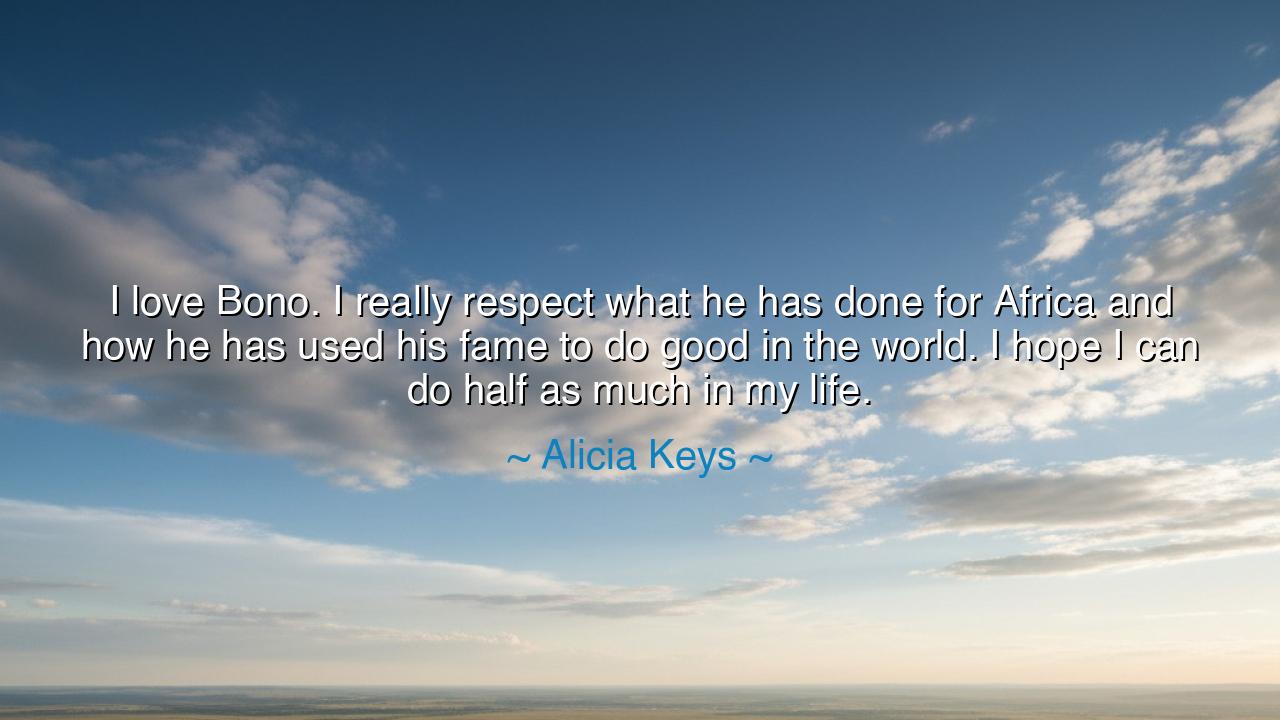
I love Bono. I really respect what he has done for Africa and how
I love Bono. I really respect what he has done for Africa and how he has used his fame to do good in the world. I hope I can do half as much in my life.






When Alicia Keys declared, “I love Bono. I really respect what he has done for Africa and how he has used his fame to do good in the world. I hope I can do half as much in my life,” she was not merely praising another artist. She was giving voice to a truth as old as the human spirit: that greatness is not measured by glory alone, but by how one uses that glory in service to others. Her words remind us that the highest purpose of talent, wealth, or renown is not self-exaltation, but the lifting of those who suffer.
The figure of Bono, whom she praises, is more than a singer; he is a warrior of compassion, one who took the stage of the world and turned it into a platform for justice. His work on behalf of Africa—raising awareness of poverty, disease, and inequality—shows that fame, when wielded rightly, becomes a tool not of vanity but of transformation. Keys recognizes in him an example of how light may be reflected outward, how the gifts given to one can become a blessing to millions.
In the ancients’ tales, we see the same pattern. Consider the story of King Solomon, who prayed not for riches or long life, but for wisdom to govern his people. The blessing he sought was not for himself, but for those entrusted to his care. Likewise, Bono has shown that the fame of a single person, if directed outward, can shine like a torch across nations. And Keys, in her humility, speaks not of surpassing him, but of hoping to achieve even half as much good—a reminder that true greatness begins in reverence for the examples before us.
Her words also reveal the eternal tension between self and service. Many receive gifts—whether talent, wealth, or influence—but turn them inward, feeding only their own pride. But to use those gifts for the common good is to align oneself with the deepest rhythms of life itself. Keys’ statement acknowledges this truth: she sees that her own path will be judged not only by her songs, but by the measure of her compassion, and the lives she touches through her art and influence.
There is also within her words a lesson about humility. In saying, “I hope I can do half as much,” she shows not envy, but admiration. She teaches that greatness is not about outshining another, but about striving toward the light they reveal. Just as disciples of old sought to follow in the footsteps of their teachers, so too does she set her gaze not on surpassing, but on emulating. This humility is itself a mark of wisdom, for it allows her to grow without arrogance, to aspire without resentment.
History gives us another example: Florence Nightingale, who, though born into privilege, chose not a life of leisure but a life of service. Her fame became the shield behind which hospitals were reformed, and soldiers saved. She could have lived for herself, but she chose otherwise. Bono, in the modern world, and Keys in her aspiration, echo that same spirit: to turn privilege into responsibility, and talent into service.
The lesson for us, then, is this: whatever gifts we possess, whether great or small, we must ask how they can serve others. Fame is not required; each of us has influence in our own circle, each of us has the power to lift or to wound. Practical wisdom follows: use your voice for justice, your skills for service, your resources for compassion. Measure success not only by what you gain, but by what you give.
Thus, Alicia Keys’ words stand as both praise and prophecy. Respect, service, humility, and hope—these are the stones upon which true legacy is built. Let us, then, strive as she strives: to do good with what we have, to follow the examples of those who light the path, and to leave behind not only songs or achievements, but lives made better because we lived.






AAdministratorAdministrator
Welcome, honored guests. Please leave a comment, we will respond soon